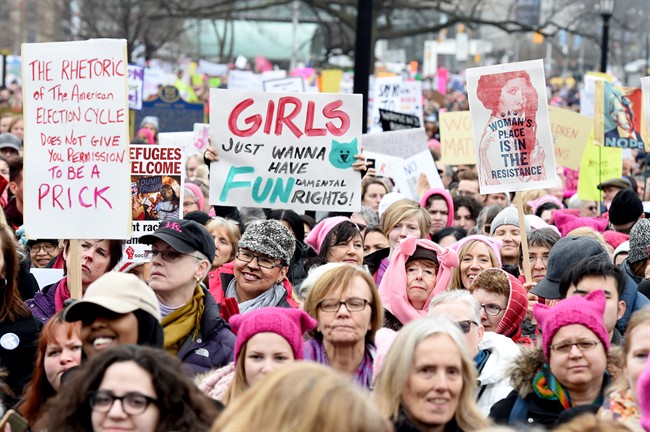As countries around the world prepare to mark International Women’s Day, a new poll reveals that a majority of Canadians believe inequality between men and women remains a problem in our society, and a portion of the population is afraid to speak up about it.

The international survey, conducted by Ipsos with a pool of more than 17,500 respondents in 24 countries, produced some fascinating and sometimes contradictory results when people were asked for their opinions on women’s rights, equal opportunities, feminism and the role of women in society.
Here at home, seven in 10 Canadians agree (22 per cent very much and 47 per cent somewhat) there is still inequality between women and men in terms of social, political or economic rights in Canada.
“There’s still a recognition that there’s more gains to be made, that there’s still a role for feminism in Canada, that there’s more equality to achieve,” Ipsos vice-president Sean Simpson said of the results.
WATCH: Trudeau on why he describes himself as a ‘feminist’

On a personal level, 22 per cent of Canadian women feel they don’t have full equality with men or the freedom to reach their full dreams and aspirations. That’s lower than the United States, where the number is 37 per cent, and way lower than Spain, where it sits at 73 per cent.

Get breaking National news
Perception gap
Simpson said there’s a gap in perception in some countries, where people may feel there is more equality than actually exists according to independent measurements conducted by the United Nations.
“In Canada, Great Britain, Australia, Sweden, Germany, we’re pretty in tune with the reality,” Simpson said.
“Brazil also stands out as being a fascinating country, in that their perception (also) meets reality. Their perception is that ‘we’re not actually very equal,’ and the UN says, ‘you’re right, you’re not.'”
Simpson noted in China, which is not a democracy, both Chinese citizens and the UN feel that there is relative equality in the country, “which is fascinating.”
Contradictions in the poll data itself were common in some countries like Russia and India.
READ MORE: Support for abortion rights strong in Canada, but poll shows we are ‘middle of the pack’ globally
In India, for example, 83 per cent of respondents (both sexes) said they would define themselves as feminists and 88 per cent said they believe in equal opportunity. But 48 per cent agreed that men were “more capable of doing things in society such as working, earning money, being educated and teaching than women.”
The percentage of people who believe women should “just stay home” was also highest in India, at 44 per cent.
The feminist stigma?
There is still a certain stigma surrounding feminism, Simpson, acknowledged, which may explain why, in a country where inequality is acknowledged by 70 per cent of the population, just 59 per cent of Canadians say they would define themselves as feminists.
About 16 per cent of us say we’re “scared to speak out and advocate the equal rights of women because of what might happen to me.”
“I think that’s why the prime minister himself has come out and described himself as a feminist,” Simpson said.
“There’s an evolution of what it means to be a feminist, and whether or not it means women first or equal opportunities … If I’m advocating openly and talk about these issues openly, will I be labelled a term that makes me uncomfortable? And certainly some people feel that way.”
The Ipsos poll was conducted between Jan. 20 and Feb. 3, 2017 using an international sample of 17,551 adults aged 18-64 in the US and Canada, and age 16-64 in all other countries, via the Ipsos Online Panel system. Approximately 1000+ individuals participated in each country with the exception of Argentina, Belgium, Hungary, India, Mexico, Peru, Poland, Russia, Serbia, South Africa, South Korea, Sweden and Turkey, where each have a sample approximately 500+. The precision of Ipsos online polls are calculated using a credibility interval with a poll of 1,000 accurate to +/- 3.5 percentage points and of 500 accurate to +/- 5.0 percentage points.






Comments
Want to discuss? Please read our Commenting Policy first.